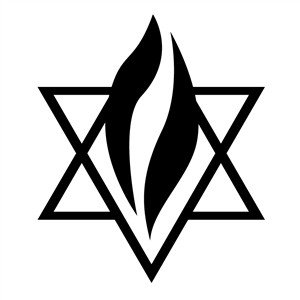
Share Your Memory of
Abram
Obituary of Abram C. Lederman
Abram C. Lederman
September 24, 2010 at age 91. Predeceased by his wife, Bella and longtime companion, Leila Denniston. Survived by his daughter, Julie (Paul) Nisson of Gaithersburg, MD; grandchildren, Ted, Robert & Ian. Abram was a Holocaust Survivor.
Funeral Services will be held Monday, September 27, 2010 at 2 PM at Brighton Memorial Chapel, Inc. (3325 Winton Rd. S.). The family will receive an hour prior to the service. Click here for directions to the funeral home. Interment, Britton Road Cemetery. Shiva will be observed in MD. Donations may be made to the Jewish Family Service 441 East Avenue Rochester, New York 14607 Link to Jewish Family Service in his memory. Eulogy given by Rabbi Matthew Field of Temple Beth El, Rochester, New York:
The fall High Holiday season is a period when our thoughts turn naturally to questions concerning the meaning of life and death. One of the most often repeated metaphors of Rosh HaShanah liturgy has us pray over and over again:
"Kotveynu b'sefer ha-chayim"
Inscribe us in the Book of Life.
However, the phrase "b'sefer ha-chayim" - usually translated as "in the Book of Life" can also mean b'sefer- "in the book" ha-chayim - of "the living". If we understand it in this sense then we realize that everything we do is written down in the human record and becomes part of somebody's Book of Life; everything about us is woven into the plots and dramas of human destiny. Each day, we make entries into the biographies of our loved ones, of our neighbors and friends, into the ledger of the general community, into the chronicles of the Jewish people. Thus, it is at this season that we are bidden to ask ourselves what kind of entries are we making into the sefer ha-chayim - into the books of those among whom we are living.
The metaphor continues- on Yom Kippur we pray:
"Chotmeynu b'sefer ha-chayim"
Seal us in the Book of Life. Or, seal us, permanently, in the book of the living.
And finally, we come to the final week of this season of festivals, prayers and promises- Sukkot. Though our prayers are not as explicit, the great Sages explain that the final decree for the Book of Life is not delivered until the end of the festival of Sukkot. We are given yet one more opportunity to make our mark. We pray again, this time, that the decree of our life be delivered. And this is what we have come here to do today- to share the story, the book of Abe Lederman's life, and to ensure that the impact his life has made is permanently inscribed in the book of the living. We share stories of his life, memories of our interactions with Abe, and ensure that of his life stretches beyond his years. In this season of prayer and introspection, we can be assured that Abe's life had a reach well beyond this people in this room, and well beyond the days of his life.
Abe was born in Lodz, Poland, in 1919. Growing up in Eastern Europe in that time, Abe witnessed the rise of Nazi power. He was sent to the confines of the Lodz Ghetto a day before his 21st birthday, and he eventually landed in the camps. At the end of the war, Abe was sent to Sweden, where he met the woman who would become his wife, Bella. Both were the only survivors of their immediate families, and together, they would begin life anew, and rebuild for themselves a family. Abe and Bella married in Sweden in 1948, and several years later, still in Sweden, they welcomed Julie into the world. In 1954, the young family moved to the United States. Cousins and family friends lived in New York City and they wanted to live close by. Jewish Family Services helped to find work for Abe and ultimately guided them settle here in Rochester. While this may not have been as close to their loved ones in New York City that they hoped for, Rochester was close enough to give them opportunities to visit. While in Poland, Abe studied electro-mechanics at a technical institute. Ultimately, he found work at Delco Products, a division of General Motors, where he worked in electro-mechanics. Abe liked his job and he remained at this position until 1984. With his mechanical background, Abe was very handy. And with a creative eye, Abe was very innovative. He enjoyed working with his hands and he loved to create and build things. He used his knowledge to fix things and solve problems. This creative approach to problem solving even allowed him to fix a broken water pump in the ghetto and bring water back to the people. But Abe did not only use his capable hands and keen eye to fix things. He also created beautiful things- furniture, lamps. Beyond his formal education, Abe had an insatiable thirst for learning and knowledge. He saw the world as filled with opportunities and wonders, and he wanted to know all about the beauty that surrounded him. Abe always wanted to be learning. He wanted his grandchildren to know that people spend their entire lives learning, and he would tell them that, at whatever age he reached, he was still learning. Abe educated himself about many things. He loved to learn. He loved to read, and he had a particular interest in history and classic literature. Abe appreciated art and music and learned everything he could about them. Abe spent his life learning because of his profound intellectual curiosity, but also because he wanted to share his skills, his knowledge, his interests and his passion with the world. He believed in people's abilities and wanted to inspire the best in people. He recognized knowledge and know-how as blessings, and he spent his life passing those blessings on to others. He taught Julie so much of what he knew and what he loved. He shared with her his passion for art and music. He would borrow classical music record albums from the library in order to introduce Julie to them, just so he could share with her his love of the music. Abe taught her about the sciences, mathematics, electronics, how to use a slide rule. Together as father and daughter, they would build things. His motivation for teaching was often meant to empower. He taught Julie how to change a car battery. He taught her ingenuity. He gave her the skills and confidence to be able to fix things and solve problems.
To Julie, Abe was a loving, nurturing, supportive father, and was just like a father to Paul. Abe took people in- loved them fully and treated them with overwhelming warmth and respect. Bella was not a well woman, and she died when Julie was just a young girl. And Abe was always there for Julie. Even on this sad, difficult day, I know that Julie feels that she is lucky and truly blessed to be Abe's daughter. He was always ready to listen, to offer comfort, and his characteristic kind and reassuring words of guidance and wisdom. It always seemed like Abe had something worthy to say. He had an inherent understanding of people and their feelings. Sometimes it seemed like he could better articulate how a person felt than the person who was feeling. And when he gave you his gentle warmth and his kind words of wisdom, it always seemed to lend perspective you could take with you beyond that moment- insight you could carry with you throughout life. His lessons can be found scribbled across the pages of the book of the living. Abe treated everyone like a full person. He always validated people's emotions. He had a gift of making people feel important. He always treated people with kindness, respect and dignity. Abe was never harsh or demeaning in any way. He would say that "you should never insult a person", and modeled that lesson with integrity. Abe never imposed his will on people. Instead, he tried to inspire them. And he did. As grandfather to Ted, Robert and Ian, he was loving. He gave of himself freely. When they were kids, he would always bring them chocolate- often Kit Kat bars. He would gladly get down on the floor and play with them. He would always listen to everything they had to say because, to him, whatever they had to offer was important. Abe was a true role model to his family. He taught by example, by who he was and how he lived his life. Abe lived his life with honor, dignity and respect. He was a true mentsch. The way Abe interacted with loved ones would make them feel valued, loved, strengthened. Abe's life was not always easy. But he never let his life's challenges take away from his life's blessings. Abe put everything into perspective. He never let life's hurdles elevate into tragedies in his mind. Having lost his family in the war and survived the Holocaust, he knew what real tragedy was- and the little things were not that. Abe brought his positive attitude to everything. Struggling, one day, with the decline of his physical independence, Abe declared that he had, indeed, had better days. Then, looking over at Julie, remembering how deeply his life was blessed, he acknowledged, “but this is a good day, too.” That was classic Abe. And just as he did in his own life, so did Abe try to redirect people's focus from darkness to light, from curse to blessing, from ugliness to the beauty he saw wherever he looked. Abe helped people find the inner strength to navigate through the bumps in the road of life and begin to focus on the shining sun ahead. He had a unique ability to inspire the best in people. Just days ago, a medical student at the hospital, who had been treated Abe, told Julie, emotionally, that Abe had a profound impact on him, and that he was truly grateful that Abe was in his life, if even just for a few days. This is how Abe touched so many people. He offered people his sense of humor and his kindness that left a positive imprint of their lives. Abe's gentle wisdom left people's lives feeling richer.
In Jewish literature the Sukkah is often taken as a symbol of man's life here on earth, and the shadow cast by the leaves of the Sukkah, which is essential to having a valid Sukkah, suggests the same thought - the thought expressed in the words of Job: "Our days are like a fleeting shadow on earth." There seems to be nothing more ephemeral than a shadow, which is here one moment, and gone the next. But our Rabbis noted that even in a shadow there can be distinctions. They tell us: "If only our lives were like the shadow of a wall or tree. Alas, it is too often only like the shadow of a bird in flight."
A bird is a small creature and the shadow that it casts is small. When it is in flight, you are scarcely aware of its presence, and would not notice its absence. The Rabbis would have us understand that the lives of some people can be compared only to the shadow of a bird in flight. For such people hardly leave any impression on the world. Their lives can be thought of as a shadow, in which one may seek refuge, during certain periods, from the hot rays of the sun. But the service which they render is not lasting, and at times may be completely absent.
However, there are people whose lives may be compared to the shadow of a tree. The shadow of a tree is always present. At times it may be larger and at times smaller, but it never disappears completely. Abe was a gentle, modest man, whose life, like the shadow of a tree, will always be there for us. As he did in life, so now in death, will Abe's soul and legacy survive. As Abe always saw the best of the world around him, may his legacy inspire us to traverse the valley of the shadow of death, and once again see beauty in the world. Though we must grieve his loss, in this way we will best honor his life. Eulogy by Robert Nisson
My grandfather was a selfless person. Even after all that happened. Without a second thought. Now that he's not here anymore how do we reflect or respond to this? I know how many lives he's affected, and I think a good way to honor his memory is to emulate his ways. That he may live on, through us. Looking at the painting behind us, do you see how close their fingers come? So close but not quite touching. It makes me wonder, if life really ends here. Everything in this world is continuously changing. Simply transforming and changing without end. Nothing created, nothing destroyed. Perhaps it is not so strange in the face of this to think that life doesn't end at death, or even begin at birth. Perhaps it is just a hope, but I hope my grandfather is happy and at peace now, he deserves as much.
Home
Rochester, New York
Birthplace
Poland



